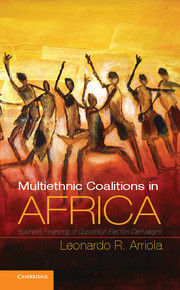
- Publisher:
- Cambridge University Press
- Online publication date:
- November 2012
- Print publication year:
- 2012
- Online ISBN:
- 9781139108553


Why are politicians able to form electoral coalitions that bridge ethnic divisions in some countries and not others? This book answers this question by presenting a theory of pecuniary coalition building in multi-ethnic countries governed through patronage. Focusing on sub-Saharan Africa, the book explains how the relative autonomy of business from state-controlled capital affects political bargaining among opposition politicians in particular. While incumbents form coalitions by using state resources to secure cross-ethnic endorsements, opposition politicians must rely on the private resources of business to do the same. This book combines cross-national analyses of African countries with in-depth case studies of Cameroon and Kenya to show that incumbents actively manipulate financial controls to prevent business from supporting their opposition. It demonstrates that opposition politicians are more likely to coalesce across ethnic cleavages once incumbents have lost their ability to blackmail the business sector through financial reprisals.
Co-Winner of the 2012 Best Book Award, African Politics Conference Group
Honourable Mention, 2014 Luebbert Best Book Award, Comparative Politics Section, American Political Science Association
"A major contribution. Arriola draws not only from Africanist literatures, but also from scholarship on other regions. His account will be broadly read and influential. Learned, rigorous, and deeply thoughtful. Full marks!"
Robert H. Bates, Harvard University
"Under conditions in which the benefits of political office are presumed to accrue only to those who share the ethnicity of the officeholder, how can a multiethnic opposition coalesce to unseat an incumbent? Leonardo Arriola provides an original and compelling answer rooted not in politics, but business: financial deregulation and banking reform liberates private capital holders from government control, which frees them to contribute to the regime’s opponents. Opposition leaders then use this money to buy, upfront, the endorsements of leaders from multiple ethnic groups. By demonstrating the connections between financial and political liberalization, and by solving the long-standing puzzle of explaining the existence of multiethnic coalitions, Arriola makes a valuable contribution to the study of African political economy."
Daniel N. Posner, Massachusetts Institute of Technology
"Arriola's book argues with impressive verve and great learning that African incumbents owe their political longevity to their ability to control domestic capital. In the process, he takes the reader through a comprehensive and compelling tour of post-colonial African political economy, shedding new light on a number of issues in novel ways, from the salience of ethnicity, to the relationship between independence parties and the private sector, and the success of opposition coalitions in the past decade. I believe this book represents an impressive achievement and will be considered one of the landmark works in African political economy."
Nicholas van de Walle, Cornell University
 Loading metrics...
Loading metrics...
* Views captured on Cambridge Core between #date#. This data will be updated every 24 hours.
Usage data cannot currently be displayed.